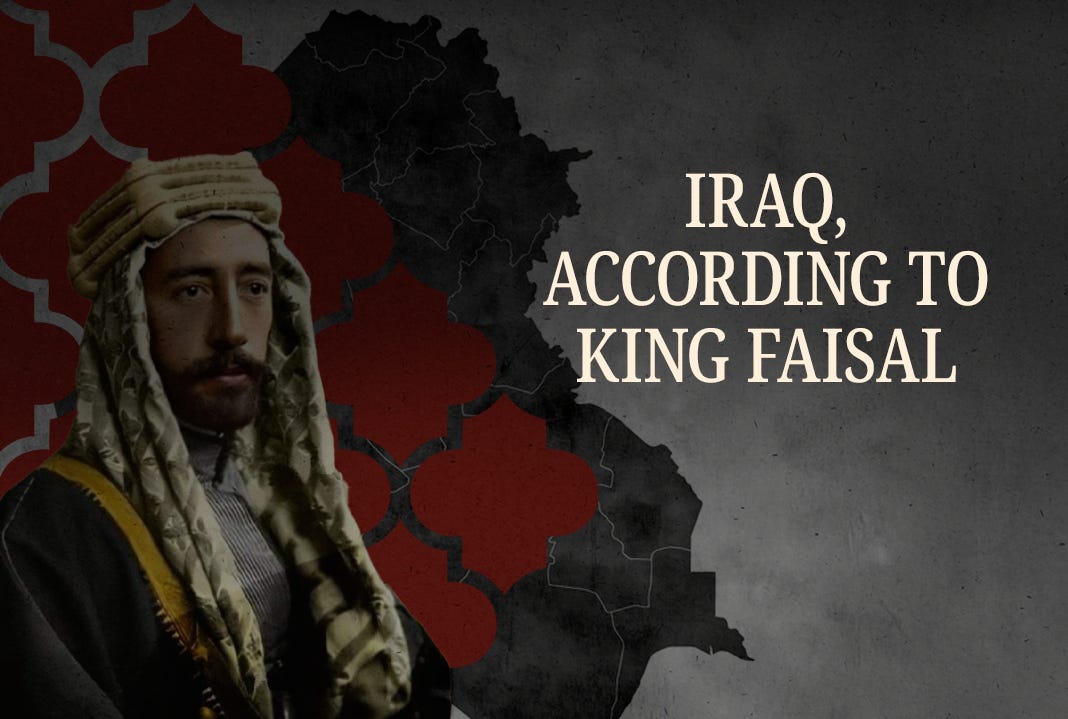Iraq, According to King Faisal
A century ago, Iraq’s first king warned that sectarianism and foreign meddling would destroy the country. He was right.
Published in 2021 to mark the centenary of the Iraqi state, Faisal I of Iraq (فيصل الأول ملك العراق ) is more than a biography of the country’s first king. It lays bare Iraq’s troubled beginnings and is startlingly relevant to the crises the country faces a century later. Reading it today, one cannot help but feel that King Faisal I diagnosed Iraq’s ailments with painful clarity, leaving behind warnings that remain unheeded.
Faisal was no stranger to loss and disappointment. Ousted by the French from Damascus in 1920, he was placed on Iraq’s throne by the British the following year. But the book shows that he quickly realized his role could not simply be that of a compliant pawn. He needed to balance British interests with the yearning of Iraqis for independence, all while trying to forge unity among communities that shared little other than being under Ottoman rule. As he told his advisor Ameen al-Rihani: “Every day we have enough work for two days… If necessary, I work twelve hours a day.” This was the burden of trying to build a state from scratch.
Perhaps Faisal’s most famous reflection, captured in the book, was his admission that Iraq was not yet a nation at all. He knew the trajectory was unsustainable. He also recognized that Iraq’s diversity could only be an asset if it was woven into a national identity.
In Beirut, addressing Arab intellectuals, Faisal insisted: “Independence is not granted or taken simply… it is built on foundations we lay with our own hands. We must achieve our independence free from ambiguity.” This philosophy guided his rule in Baghdad: he knew that British promises meant little unless Iraqis themselves created the institutions of sovereignty.
When a poisonous booklet in 1933 claimed Iraq’s Shi’a were “heretics of Iranian origin,” Faisal’s response was to jail the author and denounce the booklet in a letter he wrote to Ayatollah Muhammad Hussein Kashif al-Ghita. At a time when divisions were stark, the king defended the dignity of Shi’a citizens, understanding that such slanders threatened the cohesion of the state.
Unlike the pomp of other royal courts, Faisal’s palace impressed with its simplicity. The poet Mohammed Mahdi al-Jawahiri recalled: “King Faisal, the greatest king in the Arab lands at the time, lived in a court that was a court in name only… a simple room with a table, a carpet, and three chairs.” This modesty telegraphed that Faisal’s legitimacy was to be rooted in service and nation-building, not extravagance.
The book’s pages resonate with today’s Iraq. Sectarian divisions are still the country’s greatest weakness. Tribal and ethnic loyalties still eclipse civic ones. These divisions pit communities against each other in politics and society, often fueling conflict and mistrust.
Foreign powers continue to manipulate Iraq’s fate. Faisal understood this dynamic a century ago. The book recalls, “Faisal’s Arabist vision could not make sense unless it transcended the historical divisions between sects.” His insistence that Iraq’s future depended on unity, education, and inclusion is as urgent in 2025 as it was in 1921.
This is where the book should shame Iraq’s leaders. A century later, they are still repeating the same mistakes Faisal warned against. Iraq remains hostage to sectarianism, its politics reduced to bargains between clerics, warlords, and foreign patrons. Leaders talk of sovereignty while surrendering decision-making to Tehran. Protesters fill the streets shouting “We want a country!” because they live in one that still doesn’t function as one.
Faisal’s story is a reflection of the present and a rebuke to those in power today. He worked twelve-hour days to build a state. Politicians today spend their hours dividing its spoils. He jailed those who incited sectarian hatred. Elites today thrive on it, using it to their advantage whenever possible. He dreamed of an Iraq that could stand on its own, but they are content with Iraq as a pawn even as its citizens suffer because of it. If a century later, Iraqis are still quoting King Faisal, it is not only a testament to his vision, but to the catastrophic failure of those who came after him.
Middle East Uncovered is powered by Ideas Beyond Borders. The views expressed in Middle East Uncovered are those of the authors and do not necessarily reflect the views of Ideas Beyond Borders.




Have to admit that I know very little about King Faisal but now I’m curious to learn more.
Very interesting. Thank you for sharing 😊